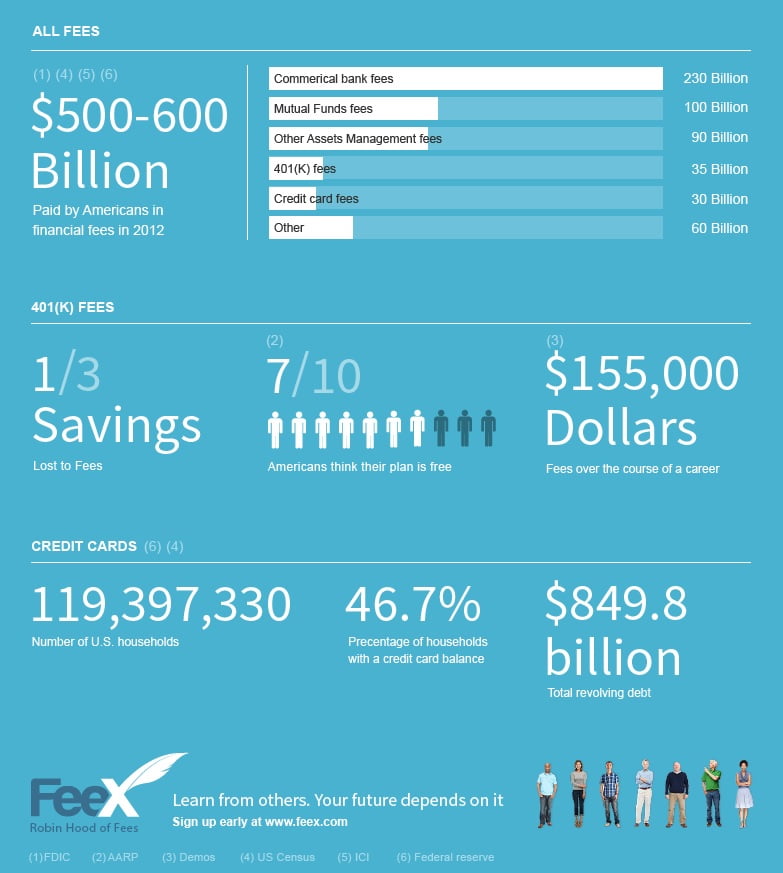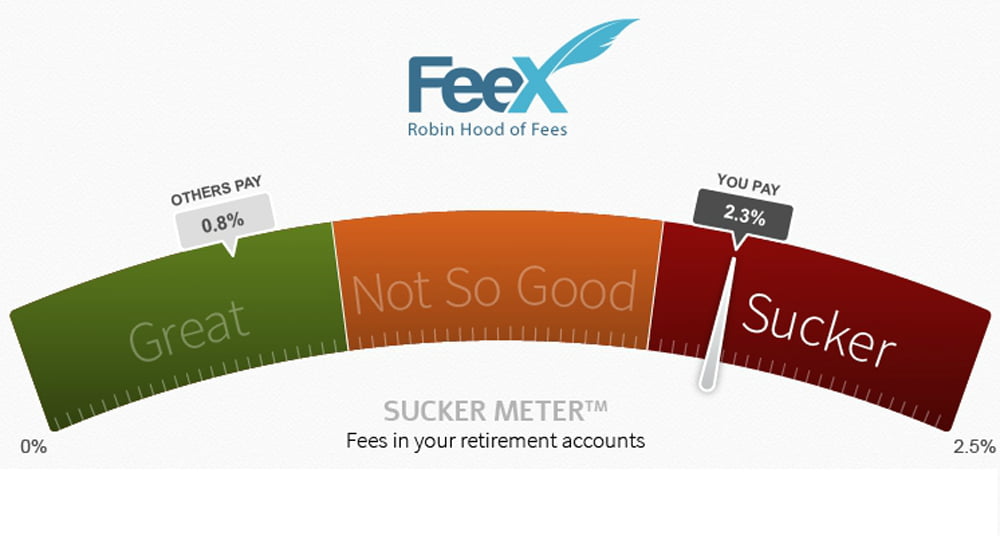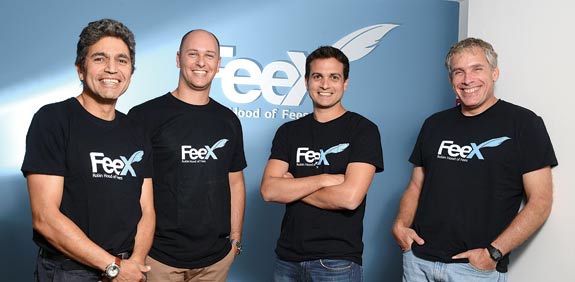How much money are you losing in hidden fees you’re unaware of? Grey charges are everywhere, especially in your bank accounts and pension plans. Israeli startup FeeX, the self-proclaimed ‘Robin Hood of Fees’ is now helping consumers to get their money back. It may be pennies per month for each consumer, but in the US hidden charges add up to a frightening , multi-billion-dollar sum every year. Hidden charges can be anything from products you never signed up for, such as ringtones for your smartphone, to services such as a gym membership you’ve already canceled – all the way to your 401(k) plan and bank account.
The first step in eliminating these hidden charges is educating consumers on the nuanced world of grey fees. According to FeeX, these fees affect everyone in one way or another, whether you see them or not. “Last year in the US, customers paid $600 billion in financial fees alone”, FeeX CEO Yoav Zurel tells NoCamels. “These fees are going straight out of our pockets in ways and methods that we don’t understand and can’t see.”
Zurel says the goal is to be the ‘Robin Hood of fees.” The website analyzes financial data from its community of users and compares the amount you pay in fees. FeeX gives you a score on its “sucker meter” to let you know how much you are overpaying in fees. It also provides insight into how much you should really be paying.
FeeX prides itself on a three-step process: find your fees, reduce your fees, and retire with more. The process is quite simple. Once you sign up and upload your financial disclosure form, FeeX scans your accounts and finds the grey fees in a matter of minutes. This financial disclosure form is provided to consumers by their financial institutions. However, these forms can be hard to understand for the typical consumer with a limited financial background.
Once the form is uploaded, the users then fill out personal information about their accounts and the process is underway. In a matter of minutes, FeeX shows its users the fees that drain these plans and provides ways to keep the money in the consumer’s hands.
FeeX looks at reports from the FDIC, AARP, U.S. Census Bureau and the Federal Reserve in order to figure out how much money people spend on fees. The team found that $150,000 is spent over the course of a career on 401K fees, while most Americans believe their 401K plan is free.
Following the account review, FeeX provides its users with financially viable alternatives with lower fees. These suggested alternatives are solely based on reducing your fees. However, it’s important to remember that FeeX does not serve as an intermediary between the financial institutions and consumers – Feex will not call the bank for you. It is still the consumer’s responsibility to make changes to his or her account.
SEE ALSO: Waze Founder’s ‘FeeX’ Raises $3M To Help You Avoid Hidden Retirement Fees
“We’re paying too much in fees”
While fees at first may appear minor and seemingly insignificant, this could not be farther from the truth. Once the fees are compounded, a different picture is revealed, leaving the consumers footing the tab. “When you’re paying one percent you’re really paying 30 percent,” Zurel explains. This is because these hidden fees add up, and what may seem like an insignificant fee will balloon years down the road.
The problem is that the grey fees are often hidden in the disclosure forms, leaving the average consumer unable to understand the financial implications. Free and clear information to the consumers is priority. “As consumers, we don’t know how much we are paying in fees, and therefore, we are paying too much,” Zurel says.
Sign up for our free weekly newsletter
SubscribeThis seems ever more important today, in a time where the most recent US National Retirement Risk Index estimates show that more than 50 percent of households will not have enough retirement income to maintain their pre-retirement standard of living, even if they work until they’re 65.
“Our mission, our purpose, our objective is pretty simple. Connect any kind of financial product that you have and we will crunch the numbers, pull out the fees and show you how to reduce them and start saving serious money,” Zurel says.
FeeX has undergone three rounds of funding, with its most recent round totaling 6.5 million dollars from venture capital firm Horizons Ventures. The company’s services are currently free and offered in both Israel and the United States, looking to expand elsewhere in the near future. The FeeX staff is led by founders David Weisz, Eyal Halami, Yoav ZureI, and former Waze co-founder Uri Levine. Waze sold to Google for an estimated $1.3 billion in 2013.
SEE ALSO: Meet The Winners: Top 15 Israeli Startups And Innovations Of 2014
27.7 percent of financial assets are hidden fees
Currently, the company claims it has 70,000 users, mostly in the US and in Israel, who have a total of $1 billion in assets, of which $277 million were marked as hidden fees by FeeX. In other words, FeeX says that nearly 28 percent of all their users’ financial assets are grey charges. By finding these hidden charges and alerting its customers, FeeX claims it saved each of its clients $19,000 on average, although this couldn’t be verified by NoCamels. FeeX supports both savings and investment accounts for free at this point, but the company plans to charge for premium services in the future.
FeeX is not alone in its efforts to empower consumers to reduce their fees. Israeli company BillGuard has stated that “it’s not only hackers, but legitimate merchants who are taking advantage of us with charges we’re purposefully meant to miss or forget about.”
BillGuard also offers services to help consumers monitor hidden fees, but contrary to FeeX – which primarily scans disclosure forms from financial institutions to find grey fees – BillGuard mainly helps people fight credit card fraud by using the wisdom of the crowds. BillGuard has developed a solution that can take an alert raised by one of their users and send it to every other user that might also be affected. The company warns them about excess credit card charges, billing errors, fraud, or other charges of which they are not aware. In other words, all problematic charges or complaints go into the BillGuard server and every user who has an account at BillGuard gets an update about the problem if it is relevant to the user’s purchasing history.
So far, Feex has marked millions of dollars in hidden fees for its clients – but now the challenge is theirs. Users then need to track down clerks and account managers, fill out paperwork and request that changes will be made to their accounts and plans. Hopefully, they won’t be charged for making these changes!

Photos courtesy of Feex, 401(K) 2012
Related posts

Editors’ & Readers’ Choice: 10 Favorite NoCamels Articles

Forward Facing: What Does The Future Hold For Israeli High-Tech?

Impact Innovation: Israeli Startups That Could Shape Our Future






Facebook comments